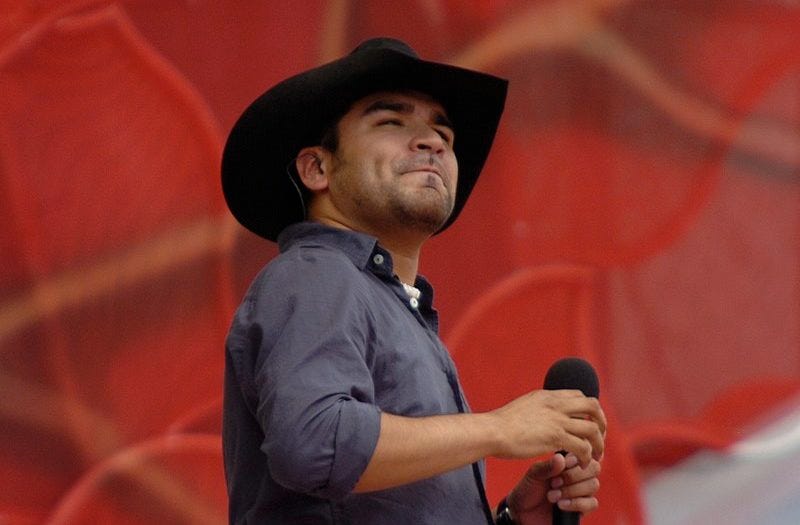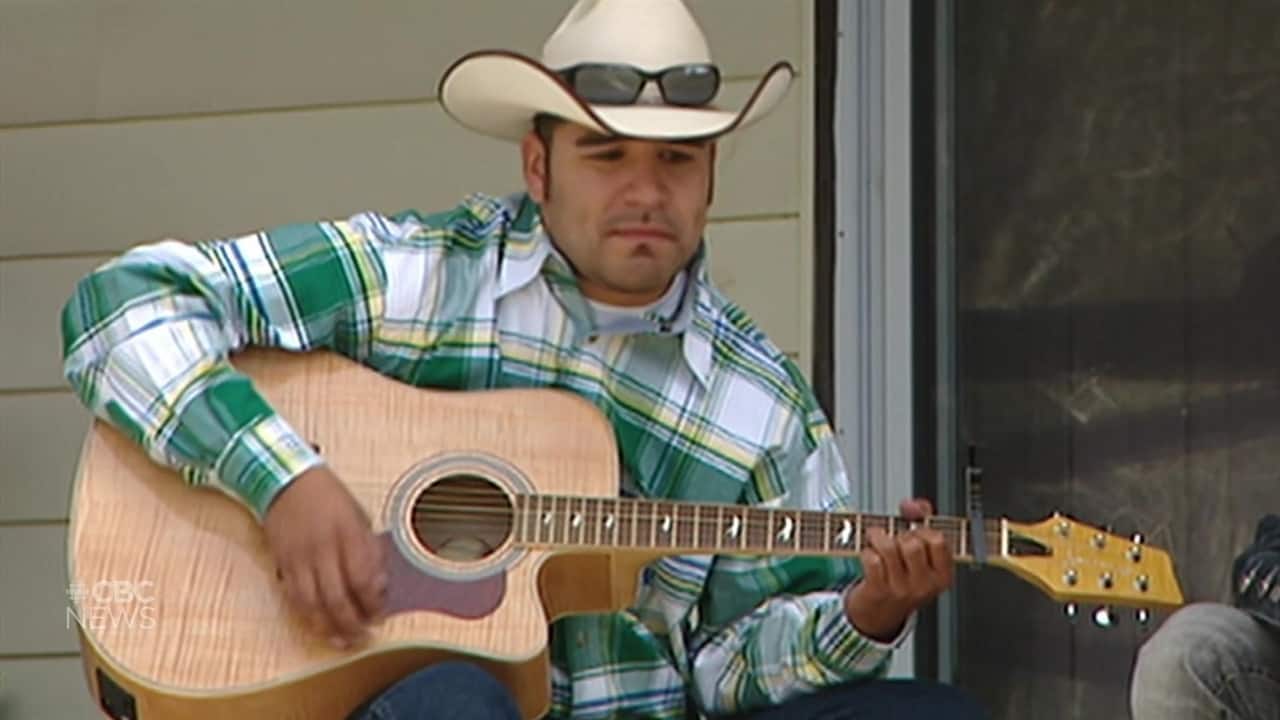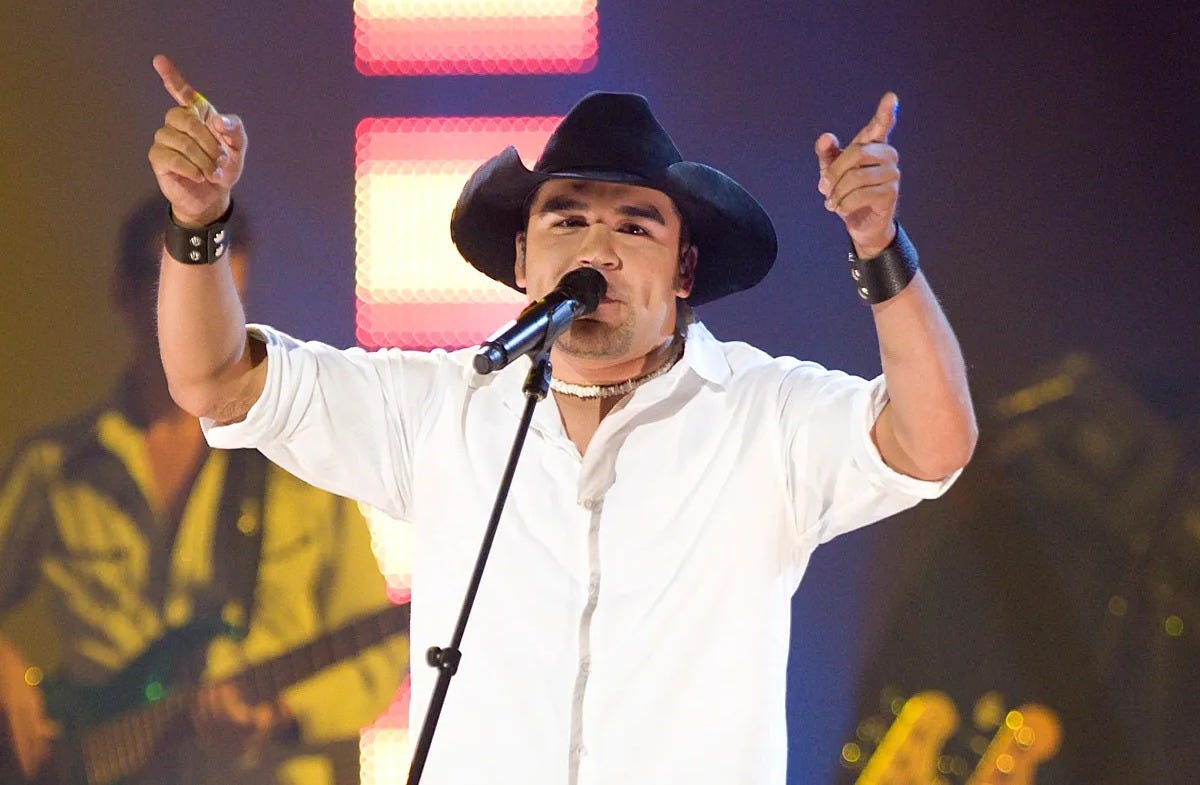Finding His Voice: The Shane Yellowbird Story
From Maskwacis to the Grand Ole Opry: how a Canadian country singer overcame obstacles and broke barriers before leaving us too soon

The glare of the bright lights hit Shane Yellowbird as he signed autographs on the red carpet of the 2008 Juno Awards in Calgary. As the lightbulbs flashed he tried to keep his bearings. This was surreal. In a few short hours he’d be on stage with Canadian Country Music’s best singing “Alberta Bound” which was sure to energize the already electric atmosphere.
Just don’t mess up, don’t forget the words, don’t stutter. His nerves were creeping in again and he could hear the schoolyard bullies taunting him from his past. He closed his eyes and tried to push through the feelings of self-doubt.
Just then, Juno host Ben Mulroney brushed by home and the next thing you know, Paul Brandt was pulling him in for an impromptu interview. Brandt and Yellowbird had become buds while on tour together that year. So much so that the two were planning to pair up for a charity mission to Africa shortly after the tour ended.
As he’d done so many times before, Yellowbird flashed his trademark smile, took a breath and spoke clearly. As he breezed through the interview, the moment finally sunk in as Avril Lavigne and Michael Bublé walked past. He was on top and he did his best to just soak it all in. It was his moment, and while it hadn’t come easy, he deserved it.
Hello again, and welcome to another installment of our Celebrating Canadian Music series. Today, I want to introduce you to someone whose story is full of hope, perseverance, and remarkable talent.
His name is Shane Yellowbird. He was a Canadian country music singer-songwriter from Maskwacis, Alberta, also known by its former name, Hobbema. Shane was Cree, and he broke new ground for Indigenous artists on the country music stage.
He had top-charting songs, international tours, and a lineup of awards many singers can only dream about. But more than all of that, he was a humble cowboy at heart who overcame a lifelong stuttering problem by singing his way through it.
Shane Yellowbird was born on July 7, 1979, in Hobbema (Maskwacis), Alberta, south of Edmonton. His parents were both on the rodeo circuit. His mom was a barrel racer and his dad a calf roper. Shane learned to ride and rope at a young age.
Back then, he was sure he’d become a rodeo cowboy, just like them. Riding a horse felt natural to him, and friends and family would see him trotting around as early as age two. But Shane had one serious obstacle in his life: a severe stutter.
When Shane was a child, his mother took him to a speech therapist, who had an unusual piece of advice. She told Shane to try singing his sentences instead of speaking them. It might sound strange, but it actually made an incredible difference for him.
Singing his sentences, allowed him to say words that he’d normally struggle with. This early experience changed his trajectory in life and pointed him toward an unexpected career in music.
Shane once said, “I was a chicken as a kid because I was always scared of getting beat up, no matter where I went. Singing became my salvation.” For him, his stutter wasn’t just frustrating or embarrassing, it was dangerous because it made him a target. Even though his sisters stood up for him, it was music that became his lifeline.
Shane grew up listening to his parents’ country music while on the rodeo circuit. Whether it was Garth Brooks or George Strait, young Shane soaked in the twang and storytelling of classic country. Some relatives called him “Little Mel Tillis,” after the famous country singer who also dealt with a stuttering problem.
Later in life Shane and his friends started occasionally visiting karaoke bars. In one interview, Shane recalled how he’d get up at a local bar with friends to sing old country songs, and a karaoke host eventually suggested he start entering contests.
“So I did and won some,” Shane once joked, “and I went from a karaoke singer to a karaoke contest winner, to a talent show contest winner, to a Canadian artist under a label.”
That label was O’Reilly International. Louis O’Reilly, who signed him in 2003, said he was charmed the first time he saw Shane perform. According to O’Reilly, Shane had the voice, look, and personality that perfectly fit the country scene. After seeing him on stage, O’Reilly had no idea that Shane was still battling his stuttering offstage.
At that time, Shane was majoring in Fine Arts at Red Deer College, but suddenly he found himself standing on stage, singing his heart out, and getting real music industry offers.
By November 2006, Shane’s first record, Life Is Calling My Name, hit store shelves. It included songs like “Beautiful Concept,” “They’re All About You,” “Pickup Truck,” and “I Remember the Music.”
These tracks started making the rounds on country radio, and Shane’s life began changing even faster. He won multiple awards at the 2006 Aboriginal People’s Choice Music Awards: Best New Artist, Single of the Year for “Beautiful Concept,” and Best Video for that same track.
He was quickly gaining attention as one of Canada’s most promising rising stars in country music.
In the summer of 2007, “Pickup Truck” became a top-five hit on the Canadian Country Singles chart. It even landed on the all-genre Canadian Hot 100. Before the year was over, it became one of the ten most-played country songs across Canada.
That kind of success not only helped Shane get noticed by major industry figures, it also earned him big honours. He was named the Chevy Trucks Rising Star of the Year at the 2007 Canadian Country Music Awards.
And at the 2007 Aboriginal People’s Choice Music Awards, he walked away with the Aboriginal Entertainer of the Year trophy. He also had wins at the Canadian Aboriginal Music Awards for Best Male Artist, Best Country Album, and Best Album of the Year.
When you think about the obstacles he faced—like the stutter he’d had since childhood—it becomes clear he wasn’t your typical rising star. His stutter was still there, but as he explained, “Today I still stutter. I just know how to detour around the words that I have a hard time saying.”
Singing had opened an unexpected door in his life, one that let him connect with listeners on a deep and personal level.
Shane’s family and community are from one of the largest reserves in Canada. Maskwacis has faced social problems including gang violence, addictions, and poverty. He acknowledged these issues but remained proud to call Maskwacis his home.
“Hobbema has its challenges,” Shane once said.
“You just have to look past it, you know, like I did. If I let the bad things about the place where I call my home get to me, I wouldn’t be doing what I’m doing right now.”
That loyalty to home also drove Shane to give back. He spoke to troubled youth, visited prisons, and organized concerts for causes that helped his community. He wanted to show people, especially young Indigenous kids, that there were different roads they could take in life.
One of his messages was always, that if he could overcome challenges like stuttering and stereotypes, others could too. After all, he said,
“Wherever you come from, whatever obstacles you face, your dreams can come true.”

But success brought difficult moments. Shane once talked about how easy it was for people to stereotype him at country music events. If he was at an award after-party with other artists, and everyone was having a drink or two, some folks would turn and say, “Oh, just another drunk native.”
That stung him deeply. Yet, he pushed forward. It took him a long time to find his voice and train himself how to use it effectively, he wasn’t about to step aside because of how ignorant some people can be with their voices.
In 2007, Shane represented Canada at the Fourth Annual Global Artist Party at the CMA Music Festival in Nashville. He also opened for the band Emerson Drive across Canada.
Then came more big news: in 2008, Life Is Calling My Name was nominated for a Juno Award in the Country Recording of the Year category. The Junos are among the biggest music honours in Canada, so this was a massive moment for him.
That year, Shane also got to play in the Juno Cup, a charity hockey game featuring retired NHL legends and Canadian musicians. He even scored a couple of goals! Former NHL players like Doug Gilmour, Bob Probert, and Paul Coffey often dominated these games, but Shane, who grew up playing hockey on the prairie, couldn’t resist showing off a bit.
Fellow artists like Tom Cochrane and Jim Cuddy were on the “rocker” side, while Shane represented the country side, though in good humour, everyone was just there for fun and to raise money for music education.
In November 2009, Shane returned with his second album, It’s About Time. He considered it more personal than his debut. “Going into the studio, I had a real vision of what I wanted this album to be,” he explained. “I’ve made sure to record songs that spoke to me.”
The lead single was “Bare Feet on the Blacktop,” and it quickly shot up the Canadian country charts, showing that Shane still had momentum and wasn’t just a flash in the pan.
At that point, he had his sights set on the United States. He wanted to push into American country radio, though that can be very competitive and expensive.
A big milestone came when he was invited to perform at the Grand Ole Opry in Nashville. That stage is the oldest continuous radio show in the U.S. and the dream of nearly every aspiring country artist. In 2009, he stood under those legendary lights, making him only the third Indigenous artist ever to perform there.
It was during this trip that he met many of his country music heroes, including Charlie Daniels and Mel Tillis. Tillis was especially meaningful to him because they had both faced struggles with stuttering.
“Me and Mel Tillis’s conversation was the longest conversation two people have ever had with the fewest words ever spoken,” Shane joked. He always tried to keep things lighthearted. But he was almost in tears when he got to call his mom afterward and say, “I can’t believe this is happening.”
Nashville also brought chance encounters with folks like Buddy Jewell (winner of the TV show Nashville Star), Gretchen Wilson, and even with his good friend, NHL star Jordin Tootoo, who then played for the Nashville Predators.
Shane told a story about meeting up with Jordin and blowing off some steam on the ice because he was so nervous about his upcoming Opry debut. Shane laughed that he once dreamed of being an NHL player too, but “the only thing holding me back was that I wasn’t very good at hockey.”
With his pregame jitters quelled at least temporarily while shooting some one-timers on the ice with his buddy “Toots,” Shane’s whirlwind Nashville adventure included a meetup with famous songwriter: Anthony Stewart.
Stewart and Yellowbird hit it off well and before their morning songwriting session was over, they’d written a new song together. Later that afternoon, Shane was in a recording studio with that same track and he got to share the moment with his family who watched as he laid down his vocal tracks.
His mother Colleen said, “It’s breathtaking to see him here in Nashville, pursuing a career that took him off the reserve because it’s hard for kids to leave the reserve and I’m really glad that he’s here and he’s pursuing it, and nothing’s stopping him.”
Colleen then teared up and as she continued: “‘Cause he’ stuttered when he was little and his sister always stuck up for him, and we took him to speech therapy, and he wouldn’t even answer a phone and I’d hear him trying to say it’s Shane and he couldn’t even say his name.”
Shane’s Nashville experience came to a head when he finally got to play on the same stage that so many Country legends started off and made their mark on the music scene. He earned it and he delivered much to the delight of his fans.
His performance was also historic as he became one of only three Indigenous artists to perform at the Ospry. By this point, it was clear: he’d made it.

The next few years were a blur as Shane toured with big-name artists like Paul Brandt and shared the stage with Country Music’s elite. In 2011, he won the Native American Music Award for Best Country Recording for “Life Is Calling My Name.”
In 2012, Yellowbird won another Native American Music Award for Best Country Recording for “It's About Time.” Shane was on top of the world. His fans loved his catchy songs, signature dimples, and down-to-earth personality.
But behind the scenes, Shane faced ongoing health problems. While his struggles with stuttering were something he shared publicly, he hadn’t shared that he had also been diagnosed with epilepsy as a kid. Or that his epilepsy, sometimes led to severe seizures.
Some of his friends, like fellow country singer Crystal Shawanda, noted that in later years he was forced to turn down shows because his epilepsy was getting worse. As the years went on and people started wondering where he’d gone, Shane began talking more openly about his health issues, letting people know why he was easing up on some public appearances.
The world heard less and less from Shane Yellowbird over the next few years, but that didn’t stop people from still enjoying his earlier albums and hit singles.
By 2022, Shane had four children and was engaged to be married to his fiancée, Sarah Garrow. The excited couple had announced their engagement just hours before the world heard the sad news of his sudden and unexpected death on April 25, 2022. Shane was only 42 years old, and the shock rippled across the Canadian music scene.
Tributes began pouring in from fans, fellow musicians, and the media. Crystal Shawanda described him as a “trailblazer” who opened doors for Indigenous artists. Aaron Goodvin called him “a truly beautiful soul.” People who worked with him always mentioned his sweet nature, sense of humour, humility, and the famous dimples that often lit up any room he was in.
Shane may have stepped back from the spotlight after 2013, but the roots he planted in Canadian country music are still strong. He was the first male Indigenous country singer in Canada to reach that level of chart success. Awards aside, he also gave a lot of his time to charity events, fundraising concerts, and youth mentorship.
Not long after his tragic passing, people in Maskwacis decided to honour him in a touching way. In early October 2023, the Howard Buffalo Memorial Centre in Samson Cree Nation opened a new facility called the Shane Yellowbird Music Recording Studio.
His cousin, Kacey Currie-Yellowbird, spearheaded the effort to create this space where young people can now make music, produce podcasts, and explore their creativity. “It’s an avenue for our youth to be able to speak about issues that are affecting them today,” said Jim Johnson, one of the project’s coordinators.
By naming it after Shane, the community is reminding everyone that dreams can be followed and goals can be reached, no matter the barriers in your path. Something Shane believed in himself and had proved with all that he’d accomplished.
Even after his passing, Shane’s songs still show up on Canadian country playlists. Tunes like “Pickup Truck” and “Bare Feet on the Blacktop” have a familiar feel that still sparks a smile. The tracks hold up even today a decade or so later.
In the end, Shane’s story is about more than stardom. It’s about courage, community, and the power of music to lift someone out of the hardest places.
We lost him too soon in 2022, but his voice still echoes through country radio, YouTube videos, and the memories of fans who cherish his music.
He wanted to be a cowboy. He ended up being a country music icon.
Thank you for spending this time with me to learn about Shane, his life, his road to fame, and the meaningful impact he continues to have.
And if you find yourself hesitating when your own “big moment” appears, think of Shane, don’t let it watch you walk away, and make sure you don’t miss that one instant that could change your life forever.
Have a rad rest of your day!
Sources used to research this story:
https://en.wikipedia.org/wiki/Shane_Yellowbird
https://globalnews.ca/news/8788997/alberta-country-singer-shane-yellowbird-dead-cree/
https://www.allmusic.com/artist/shane-yellowbird-mn0001044131#biography
https://www.newyorker.com/news/afterword/a-country-star-from-the-first-nations
https://www.stutteringhelp.org/content/shane-yellowbird
https://acma.smugmug.com/2022-April/April-25-2022-Remembering-Alberta-Indigenous/i-j7mnX7V
https://www.ponokanews.com/entertainment/yellowbird-attends-juno-awards-6686559
www.youtube.com/watch?v=hg-ncFNNdV8
www.youtube.com/watch?v=QaYYzg48K68



I have to admit to my ignorance of this Canadian country music star, and if I hadn't read this story I would still have not known of him. I have to confess my constant go to for country music has been Sirius radio which primarily plays current and past famous artists and I guess I've been missing out on rising Canadian artists. Just keep in mind as you move into the next stage of life this story of Shane. Keep em coming.